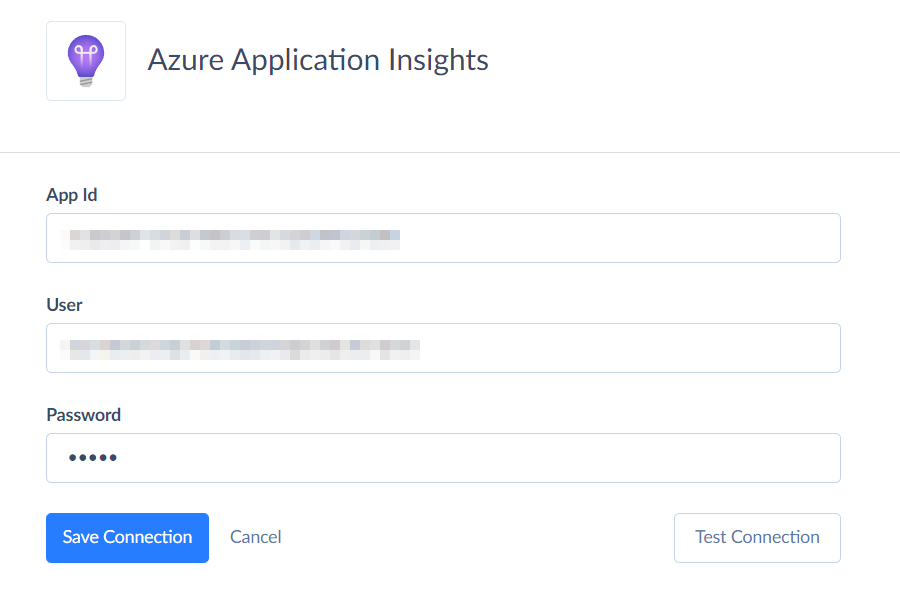Azure Application Insights
Azure Application Insights is a crossplatform service for software diagnostics data collection, analysis and visualization.
Data integration: Skyvia supports importing data from Azure Application Insights, exporting Azure Application Insights data to CSV files, replicating Azure Application Insights data to relational databases.
Backup: Skyvia Backup does not support Azure Application Insights.
Query: Skyvia Query supports Azure Application Insights.
Establishing Connection
To create a connection to Azure Application Insights, you have to specify App Id, User and Password.

Connector Specifics
Skyvia cannot write data to Azure Application Insights, its data is read-only.
Object Peculiarities
Events
The events-related data is stored in separate tables according to the event type (AvailabilityResults, CustomEvents, Dependencies, Exceptions, PageViews, Requests, Traces). Every table stores events of specific type. All events-related tables have the following specifics:
When you select data from these tables, by default Azure Application Insights API returns data for the period from 1990-01-01 to the query execution date and time value, if no other filters are applied. To redetermine the time range for the selected data you can add a filter by the CreatedDated field.
The filtering using the >= and <= operators is performed directly via API. Filtering using all other operators =, <, > and by relative dates is performed via cache. Skyvia reads all the table records and caches all the existing data, then applies a filter to this cache.
Although all events-related tables have an Id column containing GUID format value, these values are NOT always unique. Thus, these tables do not have primary keys.
The Events-related table may store a great number of records (tens of thousands of records could be added in just one day). Thus we recommend to consider this when creating the export or replication integrations, where Skyvia reads all the existing records. We strongly recommend using the filter by CreatedDate to reduce the time interval for which the data is retrieved.
Metrics
The metrics-related data is stored in separate tables according to the metrics type. Every table stores metrics of specific type. All metrics-related tables have the following specifics:
When you select data from these tables, by default Azure Application Insights API returns data for the period from 1990-01-01 to the query execution date and time value, if no other filters are applied. To redetermine the time range for the selected data you can add filters by Start or/and End columns.
Filter by Start/End fields supports only the
=(equal to) operator.
SegmentedMetrics
The SegmentedMetrics-related data is stored in separate tables corresponding to the metrics-related tables.
By default, when querying the SegmentedMetrics-tables without any filters, Azure AppInsights API returns the empty result.
To obtain the data about specific segments with metrics in query results, you have to add filter by the Interval field.
The Interval value have to be passed in the ISO 8601 format. For example, P1M = 1 minute, more details on ISO 8601 format is available here.
Same as for events and metrics-related tables to redetermine the time range for the selected data you can add filters by Start or/and End columns.
Incremental Replication and Synchronization
Replication with Incremental Updates is supported for the Events-related tables (AvailabilityResults, CustomEvents, Dependencies, Exceptions, PageViews, Requests, Traces). These tables have only the CreatedDate field and do not have the UpdatedDate. It means that only the new records are considered by the Incremental Replication.
Skyvia does not support Synchronization for Azure Application Insights.
Supported Actions
Azure Application Insights connector supports the Execute Command (SELECT operation only), Execute Query and Lookup actions.